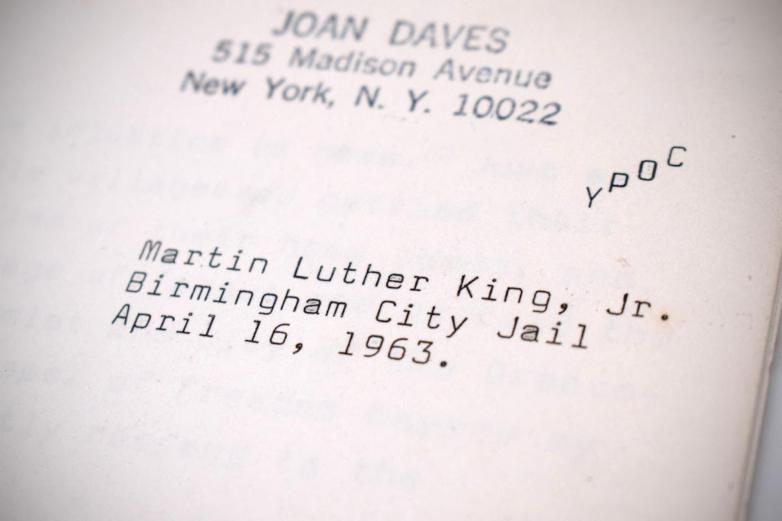Newly Rediscovered Draft of Martin Luther King Jr's Letter from Birmingham Jail

MLK letter from Birmingham Jail
Sixty years ago this month, the Rev. Dr. Martin Luther King Jr. sat in a Birmingham, Alabama jail cell, without a light or even a mattress on the bedsprings, and penned his Letter from Birmingham Jail, the most important written statement of the civil rights movement.
The newly-rediscovered Joan Daves copy of an early draft of the Letter from Birmingham Jail will be exhibited and offered for sale by James Cummins Bookseller at the New York Antiquarian Book Fair, to be held April 27-30 at the Park Avenue Armory.
The original manuscript, written on the margins of a newspaper, on small scraps of paper and pieces of toilet paper, was destroyed, making this pre-publication copy - from the files of his literary agent - one of the earliest obtainable versions.
On Good Friday, April 12, 1963, King marched with his supporters from the steps of the Sixth Avenue Zion Hill Baptist Church toward City Hall and the Birmingham central business district in direct violation of an injunction prohibiting the protest. Arrested along with Ralph Abernathy and approximately fifty other African American peaceful protesters for parading without a permit, King was taken to Birmingham jail and placed in isolation. Refusing to post bail, King remained in jail to focus the attention of the media on the injustices of segregation. The day after his arrest, on Saturday, April 13, eight prominent white interdenominational clergymen published a statement in the Birmingham News urging protesters to withdraw and referring to the protests as “extreme”, “unwise and untimely.”
Dated April 16, 1963, although written as an intellectual and philosophical response to close colleagues, the Letter transcended that narrow focus to become a cri de coeur, explaining to white moderates in no uncertain terms the justifications for civil disobedience and the Civil Rights movement, and arguably becoming the most important written document of the era.
The Letter was originally written on scraps of paper smuggled from the jail by King’s lawyers and transcribed by Wyatt Tee Walker, the executive director of the Southern Christian Leadership Conference. After King’s release, work continued on the Letter. By the first week in May 1963, the final draft was completed, typed by Walker’s secretary, duplicated, and released to a small select group of media, African American churches, and important supporters.
Following an unauthorized printing of excerpts of the Letter in the New York Post, Stanley Levison, King’s attorney and close advisor (whose phone was being tapped by the FBI), conveyed the present example to Daves, King’s literary agent. By late May 1963, she had secured a deal with Harper & Row to publish King’s next book, Why We Can’t Wait, including the text of the Letter. This copy of the Letter was discovered among her papers and bears her inked stamp in the upper right corner of the first page.















